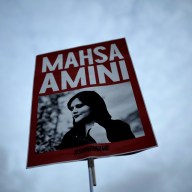OTTAWA – Expectations are high that a standard for the use of French at the Olympics will be set in Vancouver, says the international French community’s official observer of the 2010 Games.
Canada’s bilingual heritage means there is no concern French won’t be given its appropriate due as an official language of the Games, said Pascal Couchepin, a former Swiss president appointed as La Francophonie’s “grand witness” to the Games in June.
He said his job at the Games in Vancouver will be “totally different” than it will be at future Games.
“I am here to admire what’s been done, support it if necessary and prepare the upcoming Games” taking place in other countries that don’t “have the same culture of respect for the French language.”
French and English are the official languages of the Olympic movement, with the International Olympic Committee’s charter going as far as saying “in the event of any discrepancy between the French and English in the Olympic Charter or any other IOC document, the French text prevails.”
But French hasn’t always been evenly applied. Beginning in 2004, La Francophonie, an organization of French nations, began appointing a “grand witness” to monitor its use.
The goal of La Francophonie’s outreach to the Olympic movement is to increase the prominence of French worldwide and at past Games, they have signed conventions with organizing committees laying out areas where French must be used.
But in Vancouver’s case, a number of the rudimentary ways French might be incorporated are already in place, since organizers had signed an agreement with the federal and provincial governments to follow certain elements of Canada’s official languages requirements.
So, the agreement Couchepin will sign with organizers on Friday in Vancouver will be different, designed more to leave a legacy to the Olympic movement.
A spokesman for the Vancouver Olympic organizing committee said the committee has worked to ensure its plans for the Games celebrate the French language and culture.
“It’s our hope that this enhanced collaboration with la Francophonie will not only contribute to the staging of bilingual Games in 2010 but will also leave a concrete legacy on how to truly reflect and celebrate both Olympic Charter official languages for future Games’ organizing committees,” the spokesman said in an emailed comment.
While Canada may be an officially bilingual country at the federal level, in the host province of the Games, French takes a back seat to languages like Mandarin and Punjabi.
But Couchepin said that’s a further reason why 2010 is being followed so closely.
“Canadians are accustomed to dealing with bilingualism (but) in part of the country where the French-speaking people are a small minority, it’s a great example that you can have a high level of presence of French in this part of the country,” he said.
“I think that will put the standard for other countries which will organize in the Games in the future.”
With six months to go until the Games, certain questions around French still haven’t been resolved.
One issue has been whether the broadcast consortium with the Canadian rights to the Games will be able to get French-language coverage to 100 per cent of Canada’s Francophone community.
A minor flap erupted earlier this year over concerns that the sign on the Olympic speed skating oval was only in English and organizers admitted that was in part their own fault.
The level of translation services being provided at the Games are also an issue. In a December 2008 report, Official Languages Commissioner Graham Fraser raised concerns that the translation budget for the Games was insufficient and organizers have since gone to the federal government to ask for help.
Details of whether the government will assist are still being worked out.
Fraser, who met with Couchepin in Ottawa on Thursday, said he thinks the former Swiss president’s visit should be a bit of a wake-up call for the organizing committee.
“It’s not just the Canadians watching if we succeed or not to hold the Olympics in both official languages, not just the official languages of Canada but also the Olympic movement,” he said in an interview.
“I think that underscores the importance of Canada’s performance.”
















